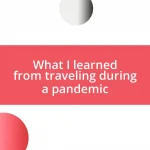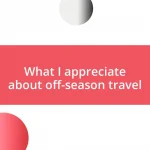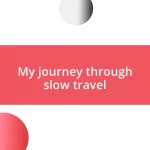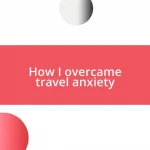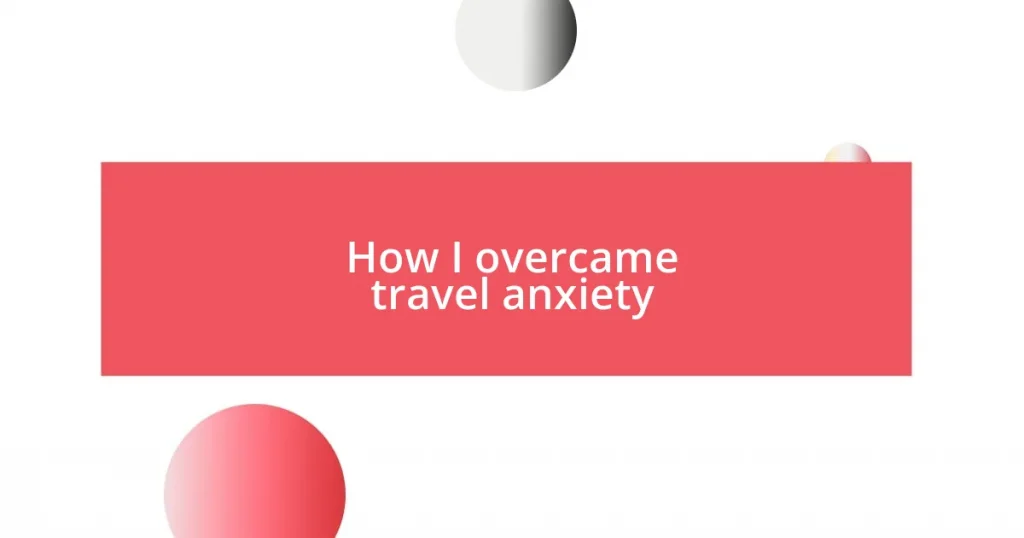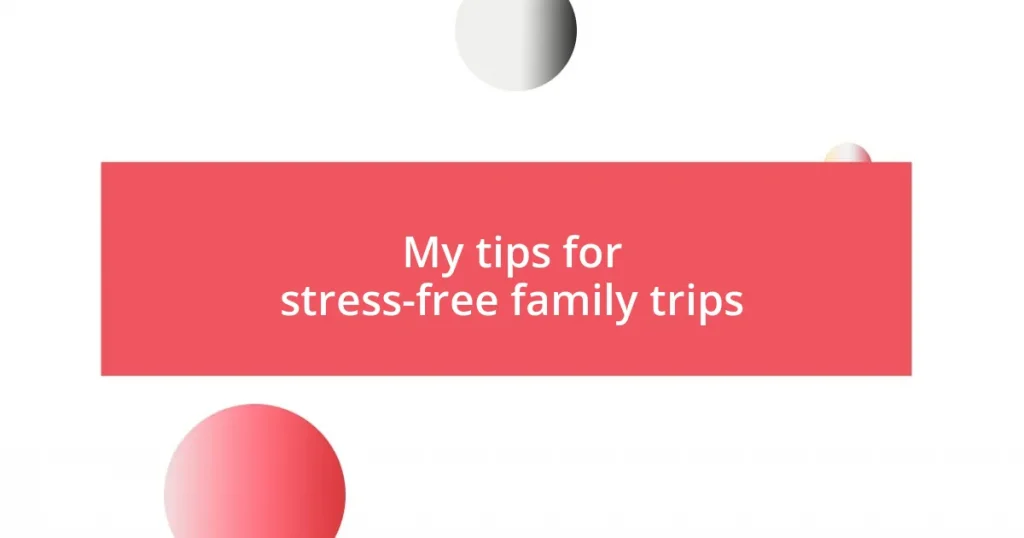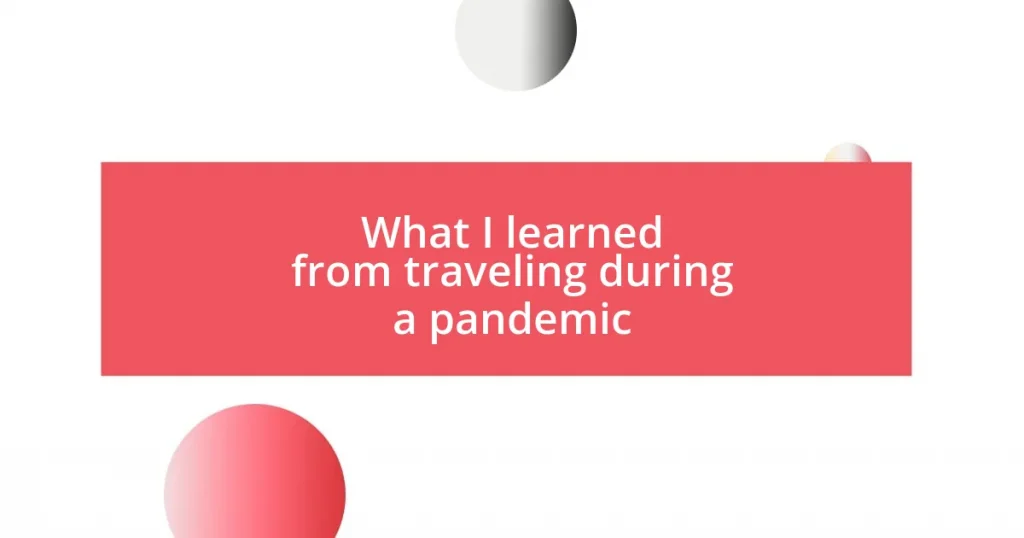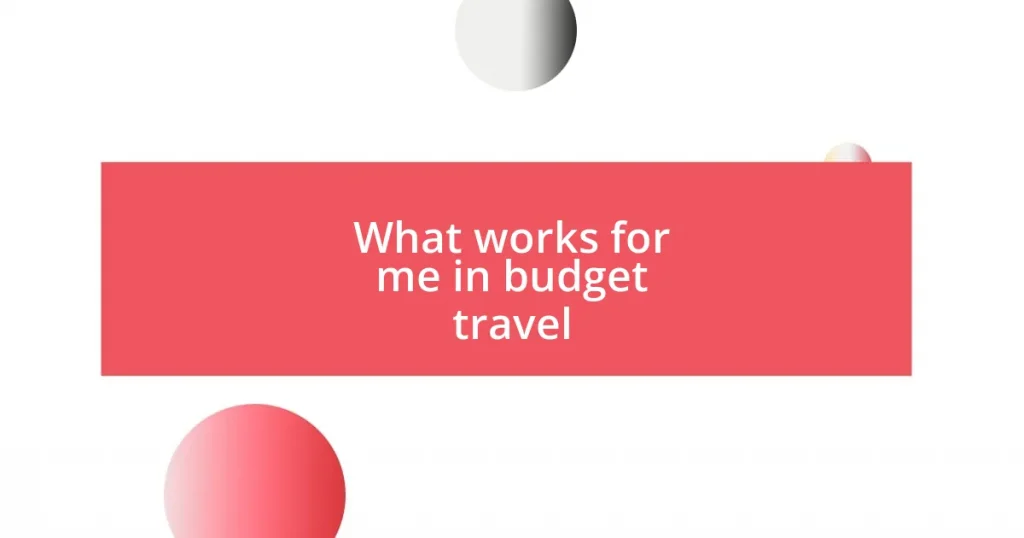Key takeaways:
- Understanding the roots and triggers of travel anxiety is the first step towards managing it effectively.
- Preparing mentally through visualization, pre-departure rituals, and creating a ‘What If’ checklist can significantly reduce anxiety.
- Having a backup plan and maintaining a flexible mindset helps in coping with unexpected travel situations.
- Reflecting on travel experiences and journaling can reveal patterns in anxiety, promoting resilience and adaptability.
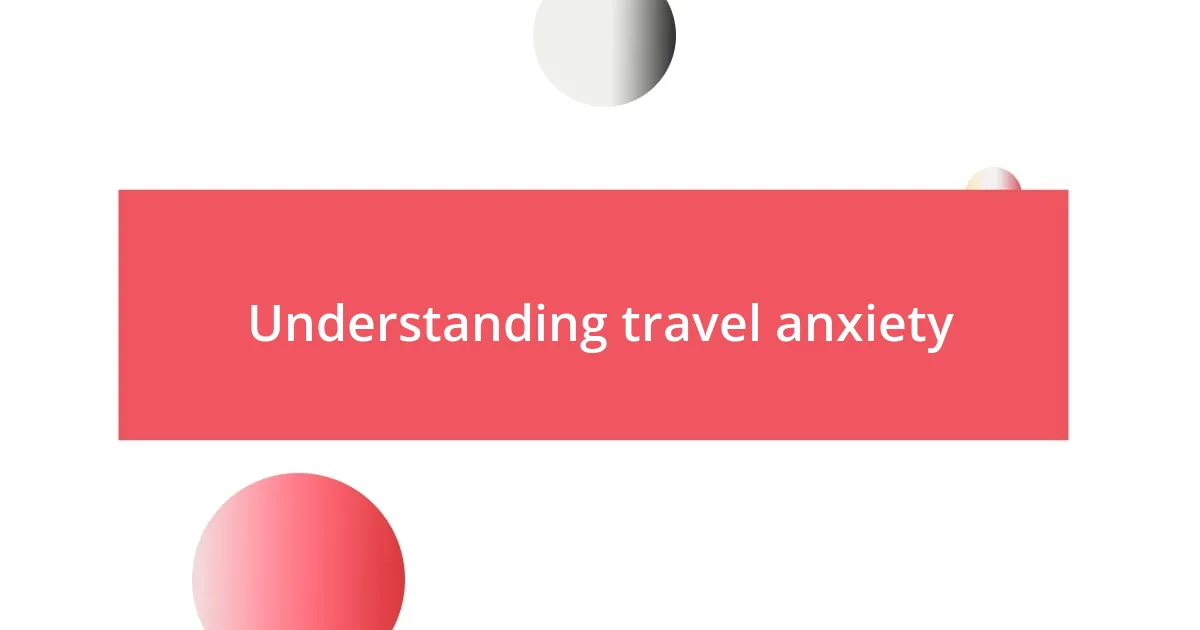
Understanding travel anxiety
Travel anxiety can feel like an unexpected storm brewing just before you head out on an adventure. I remember standing in line at the airport, heart racing, palms sweaty, as the weight of impending travel sank in. What if I forget my passport? What if my flight is delayed? These spiraling thoughts only add to the anxiety, making it harder to focus on the excitement of the journey ahead.
Understanding the roots of travel anxiety often reveals deeper concerns. For me, it stemmed from the fear of losing control in unfamiliar environments. Have you ever felt that uneasiness when trying to navigate a new city or deal with last-minute changes? Each of those experiences can amplify anxiety, turning what should be a joyful escape into a source of stress.
It became clear that acknowledging these feelings is a vital first step in overcoming them. I’ve found that simply naming my fears—like worries about language barriers or getting lost—helps diminish their power. Have you taken a moment to reflect on what specifically triggers your travel anxiety? Sometimes, just having this understanding can pave the way toward working through those feelings.
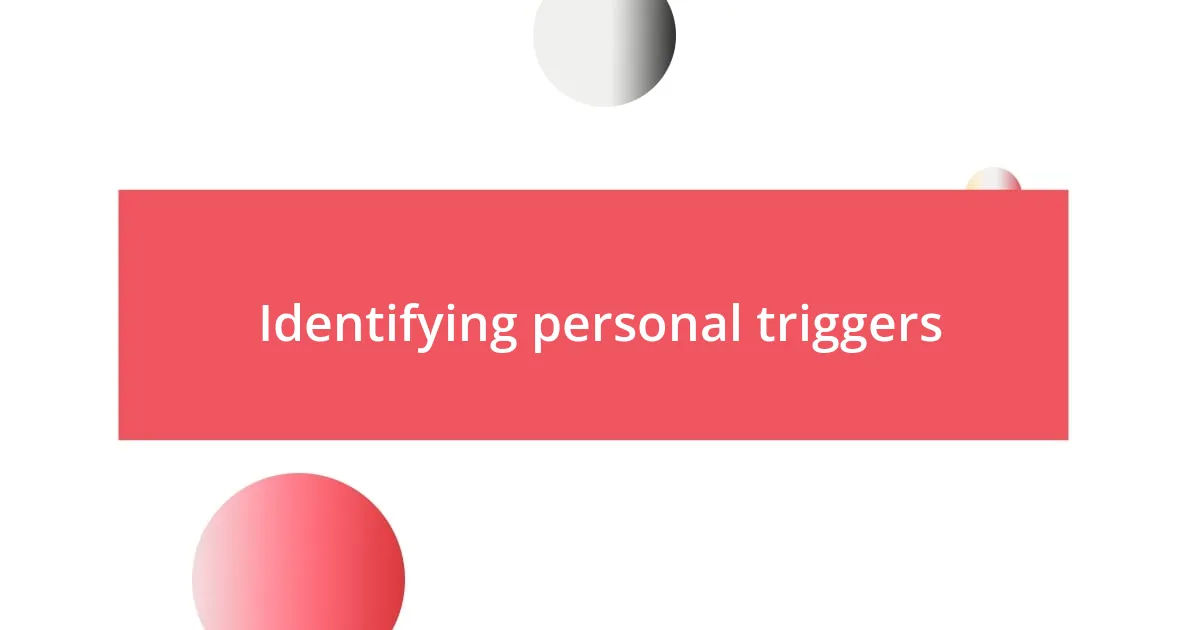
Identifying personal triggers
Identifying personal triggers is crucial in managing travel anxiety. For me, it became clear that specific scenarios set off my anxiety. I recall preparing for a trip when the thought of flying alone filled me with dread. The mere idea of being in an airport, with countless people around and the potential for unforeseen complications, sent my mind racing. Recognizing these moments of unease helped me confront them head-on rather than letting them linger in the background.
To effectively pinpoint triggers, I started noting down my feelings and experiences leading up to trips. My list included:
- Fear of missing connecting flights
- Anxiety about packing and forgetting essentials
- Worries about language barriers in foreign countries
- Thoughts of being unprepared for cultural differences
- Dread of potential travel mishaps, like lost luggage
By understanding these triggers, I was able to develop strategies that addressed them. This reflection not only lessened my anxiety but also empowered me to approach travel with greater confidence.
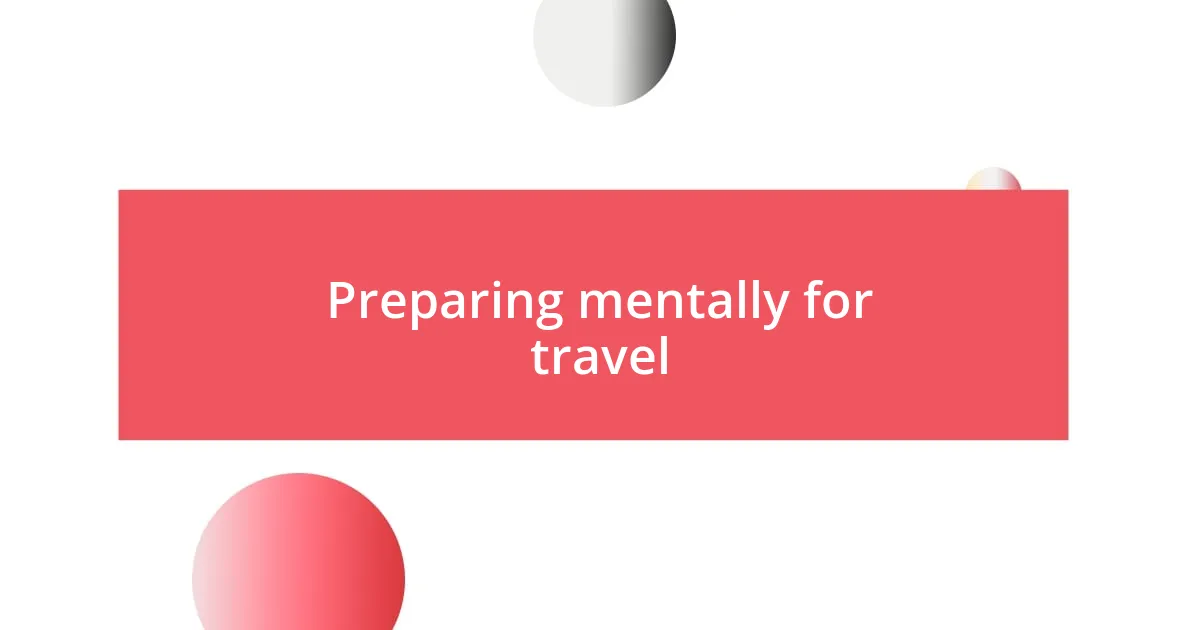
Preparing mentally for travel
Preparing mentally for travel is an essential step that can significantly alter your experience. Personally, I find that visualizing the trip can ease the mental burden. Before heading out, I close my eyes and picture the beautiful landscapes or exciting city streets I’ll encounter. I can almost feel the wind on my face and hear the chatter of locals around me, which shifts my focus from anxiety to anticipation.
Another strategy that has helped me is creating a ritual before I travel. I recall the calming influence of my pre-departure routine: brewing a cup of herbal tea, jotting down a travel journal entry about what I’m looking forward to, and playing soothing music. These simple actions allow me to ground myself, transforming any nervous energy into a chance for reflection. I encourage you to explore what kinds of rituals resonate with you—maybe it’s meditating, exercising, or reading a favorite book. You’ll likely find that it brings clarity and peace along the journey.
Lastly, preparing for potential challenges is another powerful mental tool. I remember my first solo trip to Europe; I crafted a ‘What If’ checklist to address my biggest fears. What if I missed my bus? What if I couldn’t find my accommodation? By writing down solutions for each scenario, like noting down emergency contacts or local public transport schedules, I felt more equipped to face the unknown, fostering a sense of control over my travels.
| Technique | Description |
|---|---|
| Visualization | Imagine positive travel experiences to shift focus from anxiety to excitement. |
| Pre-Departure Ritual | Create a calming routine to ground yourself before traveling. |
| What If Checklist | Prepare for potential challenges by outlining solutions for common travel fears. |
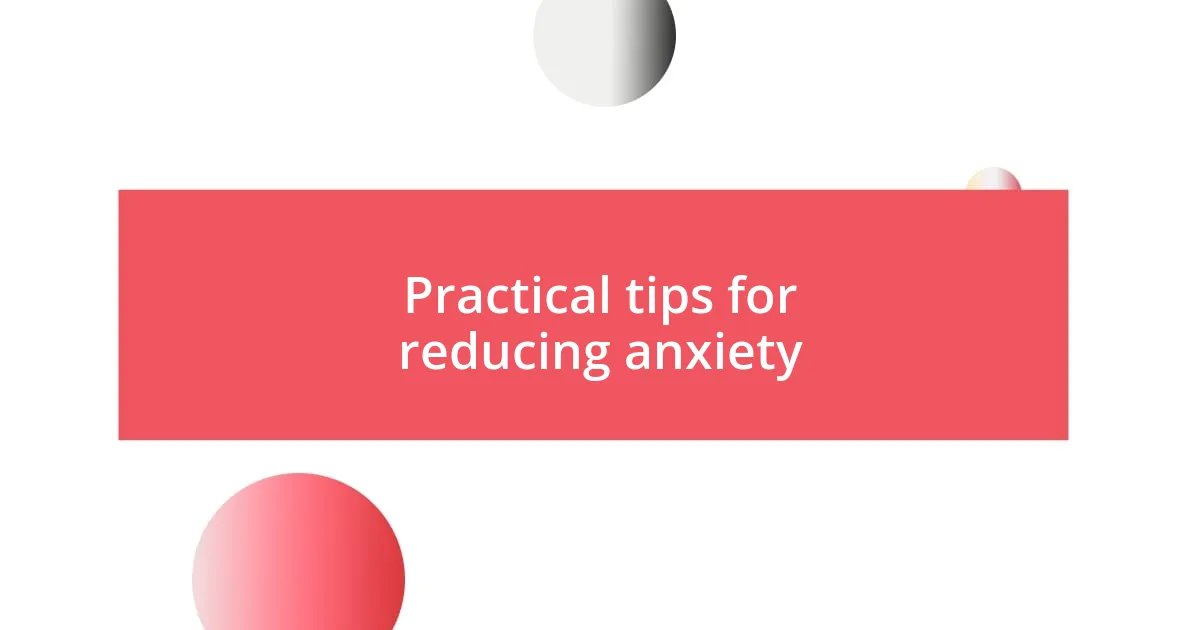
Practical tips for reducing anxiety
Preparing for a trip can sometimes feel daunting, but I discovered that packing with intention significantly reduces my anxiety. I always make a checklist ahead of time. It’s surprisingly satisfying to check items off as I gather my essentials. I remember the time I forgot my phone charger for a short getaway. That panic was a wake-up call! Since then, I’ve made it a point to double-check my list, which not only makes me feel organized but also gives me a sense of control—something crucial when anxiety pops up.
Moreover, I’ve found that engaging in breathing exercises during travel can drastically lower my anxiety levels. When those nerves hit, I take a moment to focus on my breath, inhaling deeply through my nose and exhaling slowly through my mouth. It sounds simple, but I can almost feel the tension melting away. Have you ever tried this method? In those moments, I remind myself that I’m not just traveling; I’m experiencing life, and it’s perfectly okay to feel a bit anxious.
Finally, sharing my travel plans with friends and family has also been a game-changer. Before my recent trip, I spoke with a friend who had traveled to the same destination. Her experiences were reassuring, helping to replace my fear of the unknown with excitement. Plus, knowing I had someone who understood my journey lifted my spirits. Isn’t it comforting to know you’re not alone in this? This support has made all the difference in transforming my anxiety into anticipation, allowing me to embrace adventures with a lighter heart.
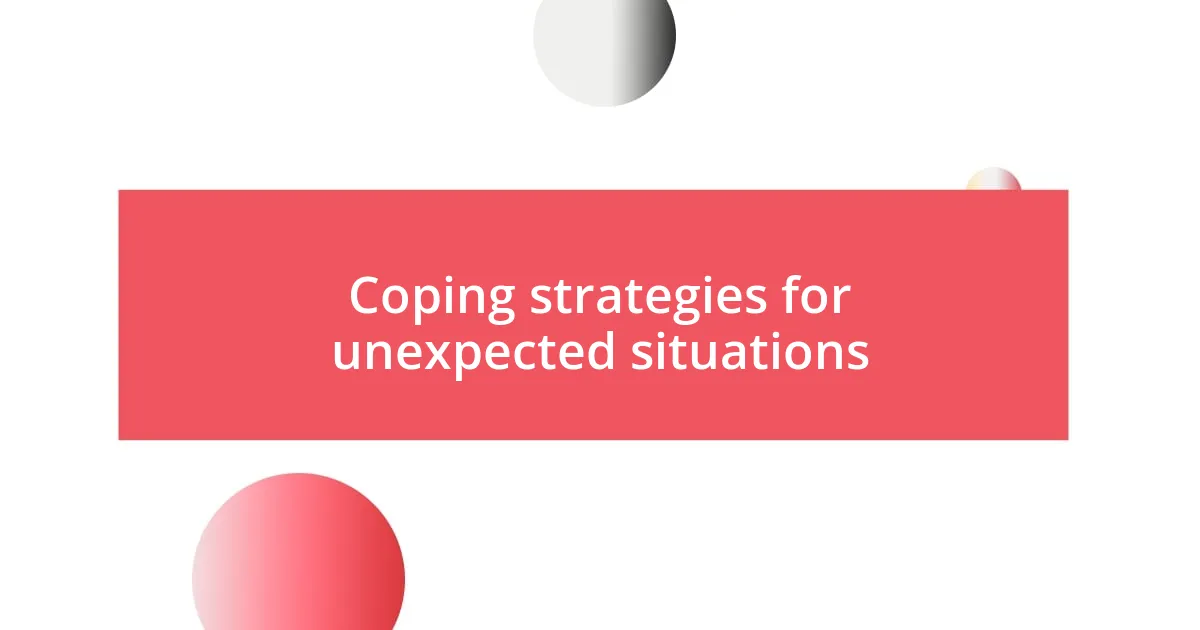
Coping strategies for unexpected situations
When unexpected situations arise during travel, having a backup plan can be a lifesaver. One time, I found myself in the middle of a train strike while in a foreign country. Instead of panicking, I pulled out my phone and checked for alternate transport options. I had already downloaded local transport apps that helped me quickly find a bus route. The feeling of adapting in the moment turned the potential disaster into an unexpected adventure. Isn’t it fascinating how some challenges can lead to the most memorable experiences?
Another effective strategy I’ve employed involves keeping a small “travel emergency kit.” I always pack a few essentials like a portable phone charger, snacks, and a mini first aid kit. During one particularly long layover, I ended up being grateful for the protein bars I stashed away. Instead of waiting anxiously at the terminal, I settled in with a snack and a good book, turning that unplanned downtime into an enjoyable moment. How often do we overlook the power of preparation for those little bumps in the road?
Lastly, I’ve learned the importance of maintaining a flexible mindset. A few years ago, a missed flight had me feeling defeated. But instead of spiraling into frustration, I decided to explore the airport. I discovered delightful shops and ended up striking up a conversation with another traveler, which made the wait enjoyable. The unexpected can be an opportunity rather than a setback. Have you noticed how the best stories often come from situations that didn’t go as planned? Embracing these moments could lead to surprising connections and experiences that enrich your journey.
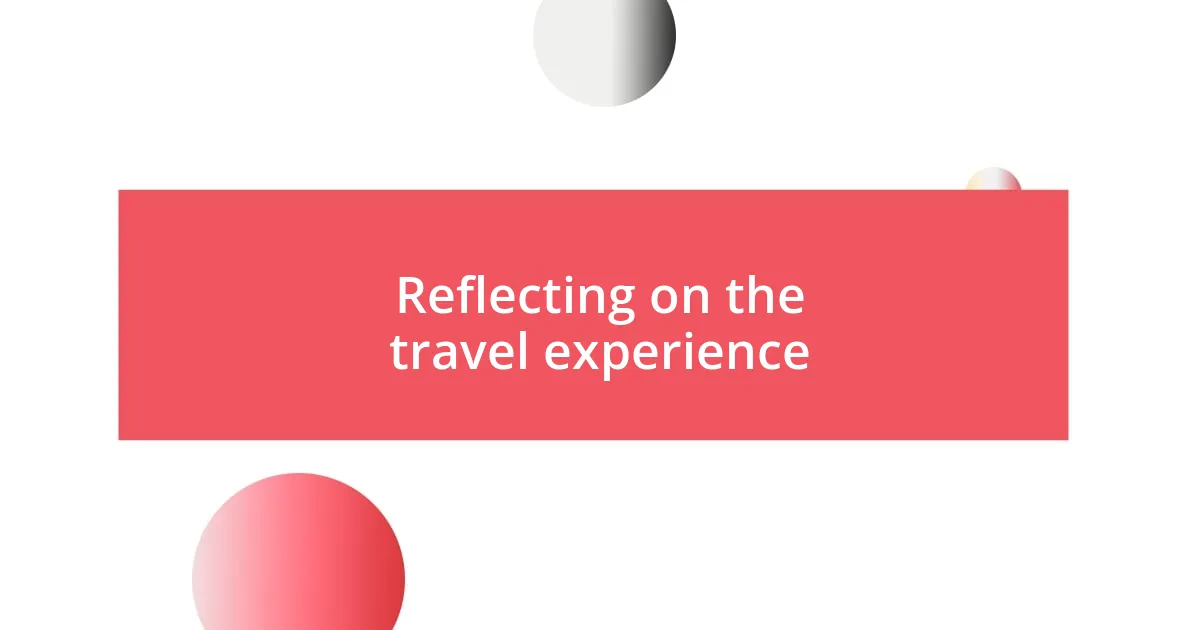
Reflecting on the travel experience
Reflecting on the travel experience has taught me how each journey shapes our perspective in unexpected ways. I vividly recall a trip where I let my worries dominate my thoughts, instead of allowing myself to absorb the beauty around me. As I finally shifted my focus from anxiety to appreciation, I felt a genuine connection with the places I visited. Doesn’t it feel empowering to recognize when anxiety is robbing you of joy?
I’ve also started journaling about my travels, and this practice has opened my eyes to patterns in my emotions. For instance, I noticed how my anxiety often surged in crowded places—airports or busy streets. Writing down these feelings helped me pinpoint triggers, making it easier to devise strategies to cope. Isn’t it interesting how putting pen to paper can clarify our thoughts and feelings?
Moreover, every trip has taught me something about resilience and adaptability. There was a moment when I got lost while wandering through a foreign city, feeling anxiety creeping in. Instead of panicking, I took a deep breath and embraced the uncertainty. That seemingly stressful situation ended up being the highlight of my journey, leading me to a hidden gem of a cafe where I met friendly locals. Have you ever found that the most unexpected detours often lead to the most enriching experiences? It’s a reminder that being open to the journey can transform anxiety into excitement.

